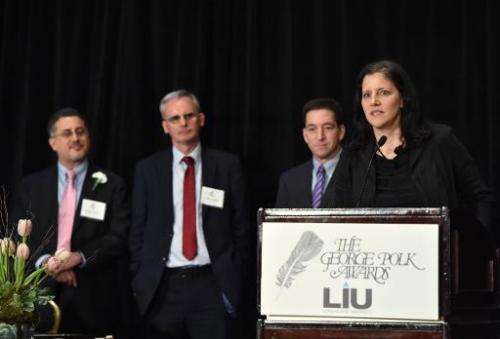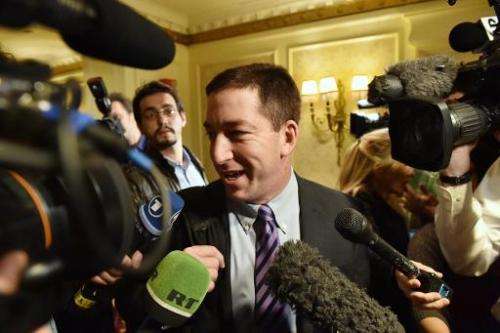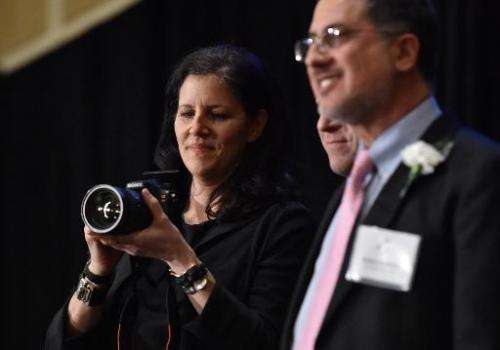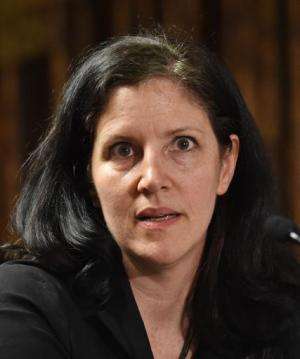Greenwald, Poitras, Gellman, MacAskill: key in NSA coverage

The Guardian and the Washington Post won the Pulitzer Prize for public service journalism on Monday for their in-depth reporting on Edward Snowden's revelations about the National Security Agency and its vast global surveillance network.
The citations to the two newspapers do not mention specific journalists, but four people are seen as key to the award-winning efforts: Glenn Greenwald and Ewen MacAskill for the Guardian, the Washington Post's Barton Gellman, and documentary filmmaker Laura Poitras.
The following are penpix of the four journalists:
Glenn Greenwald
A former civil liberties lawyer, Glenn Greenwald arguably became the most prominent journalist involved in the reporting on the NSA programs, based on leaks by former NSA contractor Edward Snowden.
New York-born and Florida-raised, Greenwald specialized in litigating constitutional and civil rights cases before shifting in 2005 towards blogging, book-writing and what he calls "adversarial journalism."
The Snowden case exploded after Greenwald's article on June 5 stating that the NSA had collected millions of phone records from Verizon under a secret court order.
The journalist followed that with a series of exposes on the NSA, including on its sharing of data with British intelligence agency GCHQ and spying on world leaders.
Greenwald—who met Snowden in Hong Kong and obtained a trove of documents from him—has been both hailed and vilified for the revelations.
In October, Greenwald announced he was quitting the Guardian for an unspecified "dream" project.
Days later, it was revealed that he would join a news organization funded with $250 million from the founder of eBay, Pierre Omidyar.
First Look Media made its debut in February with an online publication called "The Intercept," publishing fresh revelations about NSA surveillance used for drone targeting.
Greenwald spends much of his time in Brazil, where he lives with his Brazilian partner.
He made his first public appearance in the United States since the Snowden revelations on Friday where he was among the recipients of the Polk Award for his NSA coverage, along with Poitras and Gellman.
Barton Gellman
A veteran journalist with two Pulitzer prizes already under his belt, Barton Gellman is no stranger to secrets.
Gellman shared the prestigious award in 2002 for coverage of the September 11 attacks, and again in 2008 for his revelations on the influence of vice president Dick Cheney during the presidency of George W. Bush.
But even before that, Gellman seemed focused on secrets.
As a Princeton University student in 1981, he denounced the school administration's "idiosyncratic preference for secrecy and closed-door decisions on the most basic issues facing Princeton," according to an account republished last year by the Daily Princetonian.
"Far more than at most universities, Princeton officialdom likes to go about its business without the messy complications of public debate. A newspaper should not—must not—tolerate this."
The comments suggested a career focused on unearthing and exposing news which could upset those in authority.

In the Snowden case, Gellman worked with Poitras, helping sift through documents and to determine whether to trust the fugitive ex-NSA contractor.
"Laura did not know who she was talking to," Gellman told NPR last year.
"He was only willing to talk through the use of these very secret, very secure channels, and she came to me one day and said, 'Can I talk to you in confidence?' And she showed me some of her notes of these conversations."
Gellman has stood by his decision to reveal secrets that the government wants to withhold.
He left the Washington Post in 2010 to become a contributing editor at Time magazine. But he returned to the daily in May 2013 to work on the Snowden story.
A graduate of Princeton, Gellman also earned a master's degree in politics from Oxford University as a Rhodes Scholar. He is a visiting lecturer at Princeton.
Laura Poitras
One of the key figures in the Edward Snowden leaks, American filmmaker and journalist Laura Poitras has remained largely behind the scenes.
Poitras was Snowden's point of contract after Greenwald ignored messages from him about the vast data-gathering capability of the NSA.
"He kept harassing me, but at some point he just got frustrated, so he went to Laura," Greenwald told the New York Times.
Greenwald also acknowledged Poitras as the leader of the operation. She installed encryption on his machine and organized the trip to Hong Kong where they met Snowden along with Guardian journalist Ewen MacAskill.
"Operational security—she dictated all of that," Greenwald told New York Times writer Peter Maass.
"None of this would have happened with anything near the efficacy and impact it did, had she not been working with me in every sense and really taking the lead in coordinating most of it."
Poitras filmed the interview in Hong Kong with Snowden that appeared on the Guardian's website.
But she shared a byline in the Washington Post with Gellman on June 6 on the article about PRISM, the NSA program which allowed US intelligence to tap into the servers of major Internet firms.
Poitras also was credited with a byline days later in the Guardian with Greenwald and MacAskill in the article revealing the identity of Snowden as the source of the leaks.
Poitras has worked as a documentary filmmaker and had been working on a project on whistleblowers when Snowden contracted her.

Like Greenwald, she has joined First Look Media.
Poitras has been living mainly in Germany. She has complained about harassment by US border agents in the past but had no problem on her return Friday to receive a journalism award with Gellman and Greenwald.
Ewen MacAskill
Guardian correspondent Ewen MacAskill was one of three journalists who met Edward Snowden in Hong Kong and who revealed him as the source of the leaks about massive US surveillance.
MacAskill, the Guardian's defense and intelligence correspondent, was Washington bureau chief from 2007 to 2013.
He was the newspaper's diplomatic editor from 1999 to 2006, and chief political correspondent from 1996 to 1999. Prior to that, he was political editor of the Scotsman from 1990 to 1996.
MacAskill traveled to Hong Kong with Greenwald and Poitras for the interview over several days in which Snowden revealed his motives for leaking a trove of secret documents.
Those three shared a byline on June 9 for the article which named Snowden, and included a video clip of the Hong Kong interview.

MacAskill defended Snowden and the decision to publish leaked documents in a BBC interview last June.
"On the issue of whether he was a criminal or a whistleblower, people have to decide for themselves," he said in the interview.
"I tend toward the view that he was whistleblower. He was inside the CIA, he was inside the National Security Agency... and he didn't like what he saw there."
MacAskill also praised Snowden for his "courage."
"He opted not to remain anonymous and that took courage," MacAskill said.
"And having come out, he knows his life is effectively over as it was."
While Greenwald has left the British newspaper, MacAskill has remained, writing about issues including the crisis in Ukraine and the military situation in Afghanistan.
© 2014 AFP



















